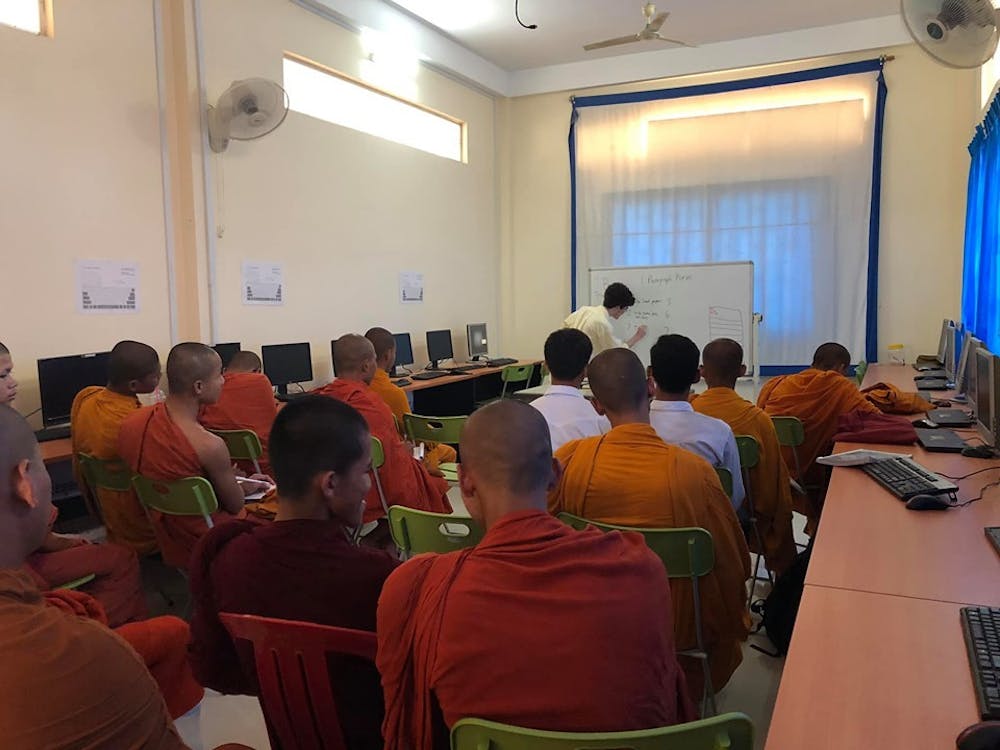DISPATCH
BATTAMBANG, CAMBODIA | September 4, 2019
We read excerpts from memoirs. We read love letters. We read scientific essays on everything from sleep to the importance of owning a dog. To watch my students, in a language that was not their first, grapple with complex topics of empathy and memory and loss and love was nothing short of beautiful.
Every Monday, Wednesday, and Friday, at 3 p.m., reading club began. A group of about 10 Theravada Buddhist monks, followed by about a half-dozen laypeople, would file into a small classroom in a small university in the small(ish) town of Battambang, Cambodia.
And then, we would read.
Venerable Tola, my boss for the summer at Preah Sihanouk Raja Buddhist University, had asked me to start this reading club because he was concerned that too much of Khmer education was focused on comprehending and then repeating information, and too little on argumentation and analysis. Many students at the university, monks included, were looking to write theses, and to do so, Tola believed they needed the skills to identify arguments and craft their own.
For two months, I had the privilege of teaching that class, as well as two English language classes in the evening.
Outside of class, I got to visit Angkor Wat. I took a weekend trip to Kuala Lumpur. I got to see Venerable Tola’s hometown and meet his parents. The summer abounded with experiences that I will never forget.

But what I loved most about the summer were the stories I was told. From hearing Venerable Tola talk about growing up listening to Sinn Sisamuth, the “Elvis of Cambodia,” and wanting to be just like him someday, to watching the culture fair the students put together to celebrate Cambodian food, fashion, and sports, and finding so much joy in their history, I loved hearing all of their stories.
Since the time difference in Cambodia put me 11 hours ahead of Eastern Standard Time, most of the time I spent Skyping with my girlfriend was early in the morning, before my work started in the afternoon, just as she was going to sleep. Each night, I’d regale her with the events of the day, such as when I ate a frog but refused to eat a scorpion, or when I introduced Venerable Tola to the concept of breadsticks, or when I taught a class of monks the word “dude.” As a result, I went through my day constantly thinking, “this will be a great story to tell Anna in the morning.”
That changed how I lived my trip. There was something to telling the story that authenticated those experiences for me. It was as if the experiences didn’t feel quite real if I didn’t tell her about them.
On the last day of my reading club, as a special “bonus” reading, I presented my students with W.H. Auden’s poem “September 1, 1939.” After eight dreary stanzas on how terrible the world around him seems, Auden ends his poem on a strangely hopeful note, saying that, despite all of the gloom, there are “ironic points of light...wherever the Just/exchange their messages.”

My students concluded that Auden’s focus on the exchange of voices to show an “affirming flame” requires individuals to go outside of themselves, to participate, and to find meaning in that darkness. What gives Auden hope, one of my students remarked, wasn’t that he was merely alive, but that he could share that life with someone else.
Battambang has made me think a lot about sharing stories, both the ones I was told, and the ones I’ve gotten to tell others. To tell a story, I think, is to be a part of something bigger than yourself.
For now, all I feel is thankful. Thankful for Battambang, thankful for my experiences there, and thankful that I have people in my life to exchange experiences with.
Follow Ben on Twitter @wbenball.
Editor’s Note: The Prospect is thrilled to debut a new series, “Dispatches,” in which ‘Prince’ staffers reflect on their travel and work experiences over the summer. Whether close to campus or across the globe, our staff are gaining new perspectives and insights, and we are delighted to share some of them with you.








